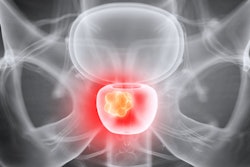
Despite numerous studies and years of research into the benefits of PET imaging with sodium fluoride (NaF) for cancer patients with bone metastases, the U.S. Centers for Medicare and Medicaid Services (CMS) has again rejected reimbursement coverage.
CMS' denial follows almost a decade of data collection and outcome evaluation by the now-shuttered National Oncologic PET Registry (NOPR). The registry's goal was to convince the agency that NaF-PET leads to beneficial changes in patient management and more appropriate curative or palliative care.
"We are disappointed," said Dr. Barry Siegel, professor of radiology at Washington University in St. Louis and co-chair of NOPR. "We feel as though we laid out our plan, were told [by CMS] to proceed, produced the results that we expected with our plan, but then were basically told that those results were insufficient to move the needle."
Regulatory rebuke
The latest denial came in a May 9 letter to three NOPR co-chairs: Siegel, Dr. Bruce Hiller from the department of internal medicine at Virginia Commonwealth University, and Dr. Anthony Shields, PhD, a professor of medicine and oncology at Wayne State University.
"After a careful assessment of your request and supporting documentation, we have determined that the additional evidence submitted is insufficient to support a reconsideration as it would not change our existing national coverage determination (NCD)," wrote Tamara Syrek Jensen, director of CMS' coverage and analysis group. "Therefore, we are not accepting your request for an NCD reconsideration at this time."
The communiqué from CMS was not released by NOPR until this week to give the NOPR chairs time to talk to CMS representatives about the reasons for the decision. The two groups had that opportunity this week.
In recalling the latest tête-à-tête with regulators, Siegel said that CMS referred to language in the NCD that states that under CMS' coverage with evidence development protocols, the nuclear medicine community would need to demonstrate that use of NaF-PET leads to an improvement in patient survival, an improvement in quality of life, or a change in management to appropriate palliative care or to appropriate curative care.
"We wanted to have the opportunity to talk to CMS to see if we could get a better understanding of what led to the [CMS] decision," Siegel told AuntMinnie.com. "Pursuant to that phone call, we will continue to think about whether there is a path forward, but it is not clear that there is."
NOPR's legacy
For much of this decade, NOPR, the Society of Nuclear Medicine and Molecular Imaging (SNMMI), the World Molecular Imaging Society (WMIS), and the American College of Radiology (ACR) have been working with CMS to bring coverage to NaF-PET.
Starting in 2011, clinicians from across the U.S. were encouraged to send case report forms to NOPR to validate NaF-PET's efficacy. Sites reporting to NOPR performed more than 65,000 scans for Medicare beneficiaries in an effort to convince CMS that it was, indeed, a valuable modality for cancer patients and that reimbursement for the management of patient care was justified. Since the closure of NOPR patient accrual in December 2017, this imaging service is no longer covered for Medicare beneficiaries.
From the NOPR data came a February 2014 study that found NaF-PET changed treatment in more than half of men with prostate cancer and could prove to be a better tool than bone scintigraphy.
Hopes of reimbursement were buoyed in March 2015 when CMS opened a review of its reimbursement policy on NaF-PET that would have ended the requirement that PET facilities collect data when performing the scans. Six months later, however, CMS rejected a proposal to loosen restrictions on reimbursement for NaF-PET scans to detect bone metastases.
One more try
As NOPR continued to collect results, CMS issued a final decision memorandum in December 2015, stating there is sufficient evidence to determine that using NaF-PET to identify cancerous bone metastases "is not reasonable and necessary."
Then, this past December, after conducting further analyses of its data, the NOPR working group formally submitted yet another request to CMS for reconsideration of the NCD for NaF-PET. Again, last month, CMS concluded the evidence was insufficient to support reconsideration.
One question that arises from CMS' decision not to reimburse for sodium fluoride is how radiopharmaceutical manufacturers will react. Will there be less of a priority to supply a product that isn't covered by Medicare?
"I cannot predict at the moment, but it would not surprise me if commercial suppliers who have to pay annual fees to the [U.S. Food and Drug Administration (FDA)] to keep that drug in play might say it is not worth it because the volume is too low," Siegel said. "That would be very sad."
Despite this latest setback, SNMMI, WMIS, and ACR plan to continue their work to convince CMS it should support Medicare coverage and beneficiary access to NaF-PET.




















